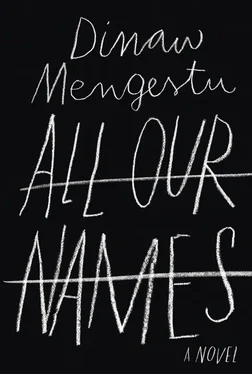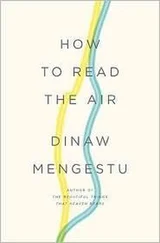I rearranged the order of the monuments, moving the White House to the center and placing the Golden Gate Bridge right next to it, then trying other combinations: New York and San Francisco; D.C. and New York. I became so absorbed in my made-up geography that I didn’t notice David watching me.
“What are you doing?” he asked me.
“Practicing,” I said.
I handed him the letter that Isaac had sent, hoping he could help me interpret it.
“Is he serious?” he asked me.
“Look at the letter. It’s typed. That has to mean something.”
“Yes, that he didn’t have a pen. That he has a fondness for typewriters. That his handwriting is terrible.”
He pointed to the monuments on my desk.
“And he sent you those as well?”
I was almost too embarrassed to say yes. I waited for David to tell me that Isaac was delusional, but he fingered each of the monuments without lifting them.
“Who knows, Helen. Maybe your Dickens is on to something,” he said.
He squeezed my shoulder before turning back to his office. As soon as he was gone, I picked up the phone and called Isaac. He picked up on the fourth ring. I felt my right eye quiver when he said, “Hello.”
“Isaac.”
“Helen.”
“You’re back.”
“You received my package.”
“I’m looking at it right now.”
“Were you surprised?”
“I didn’t know where you’d gone. You never told me you were leaving.”
“I didn’t know until the last minute. I will tell you about it.”
“This evening?”
“Yes, this evening. If you are available.”
“I’ll be free after six,” I said.
I had planned to visit Rose and a young single mother of two whose file I had just opened that afternoon, but at 3 p.m. I was still sitting at my desk. I had spent the hour after hanging up imagining what it would be like to be alone in a room with Isaac again — what his arm next to mine would feel like, what his voice would sound like — and then I started trying to picture us in New York and in San Francisco and D.C. I’d lived in this country my entire life and had never come close to any of those places. All my trips were strictly middle-of-the-road.
I hadn’t read Isaac’s file since we met. There was hardly anything in it, to begin with: a single loose leaf of paper with his name and date of birth and a brief paragraph stating he was here as a foreign-exchange student. His was the only file like that in our office. Our other clients came with criminal records and hospital records, income-tax reports and psychological evaluations. In comparison, Isaac’s single-page life story had seemed like a blessing when I first saw it.
I read his file two more times, and each time came up with a part of his past that appeared to be deliberately missing. There was no month or date of birth, only a year. His place of birth was listed only as Africa, with no country or city. The only solid fact was his name, Isaac Mabira, but even that was no longer substantial: any name could have filled that slot, and nothing would have changed.
I left my office a few hours earlier than I had planned and decided to take a drive through town — or, to be more precise, past all the places where Isaac and I had spent time together. I drove past the diner, and then the Goodwill store where we’d picked out his couch and kitchen table, the post office, the grocery store. That was the bulk of what we had; I had forgotten how poor we were as a couple. I tried my best to draw a solid image of Isaac, first alone, and then together with me, and when that wasn’t enough, I drove to the university and parked near the library, where I hoped the memory of him on his first day in Laurel would remind me of who Isaac “really” was when I wasn’t a part of the picture.
The campus had gone back to what it had been during my freshman year — a clean, calm, and ordered sanctuary of semi-Gothic buildings and great towering trees that even when bare had given me a measure of solace. There were no protests on the lawns or banners draped from the windows, as there had been during the past two years. A few weeks just before I graduated, guardsmen and riot police had been stationed outside of all the main buildings; there were days when the entire campus had been closed off and traces of tear gas could be seen from blocks away. I had watched that on television, from the safety of my mother’s living room, convinced that I was missing out on something important, but now I thought maybe I hadn’t missed anything at all. The students that I could see from my car seemed content with what life had given them, and there was no trace of any of the anger that only a few years earlier had seemed so important. One war had ended; that was enough for now.
I watched five black students settle on the library steps in a semicircle, with the boys two steps above and the girls fanned out beneath them. Had Isaac been younger, I still couldn’t have pictured him among that crowd. They were, for all their mystery to me, no different from the other students sprawled out on the steps, confident in their aimlessness, convinced that the future would provide. There was never the slightest trace of such cool confidence in Isaac. He told me once that he’d accepted the fact that there was no place in the world where he felt fully at ease. “When I lived with my parents, I used to take long walks by myself, even when I was very young and was forbidden from doing so. I couldn’t help it. I was restless. I always felt out of place. I didn’t know it was permanent, though. I thought eventually I would find a house or a street that seemed to have been made just for me. I think I have walked more miles than just about any man I know, and I have learned that if I were to walk every day for the rest of my life, I would never find such a place. That is nothing to be sad about. Many people have it worse. They dream of belonging to a place that will never have them. I made that mistake once.”
I didn’t feel sorry for him when he told me that, but, watching those students, I did think that, if it were possible to grant the small measure of entitlement that was theirs to others, then that would be worth fighting for. I didn’t have the words to explain it at the time, but as soon as the thought crossed my mind, I knew it was wrong. There wasn’t a protest in the world that could have done that for them. The right to claim their small share of this country had always been theirs; they knew that long before the rest of us. I wondered if the same would ever be true for someone like Isaac.
I decided to make a tour of the campus before returning to my car. I expected to feel a bit of nostalgia for my college days, but instead I had the feeling I was walking past the perfectly manicured lawns, with their wilting tulips, and the roughly carved stone buildings for only the second time in my life. The first had been with my head down, and although I had taken my time, over four years I never thought to look up and really notice what surrounded me. It wasn’t nostalgia but regret that guided me through the campus that afternoon. All that time lost — not to have done more, but to have seen better.
I was thinking of the dozens of afternoons I had spent sitting on the lawn as a student when I noticed a man slowly walking down the steps of the science building. I could only see the back of his head, but that was enough to know that it was Isaac.
I followed him to the campus parking lot. He had a slow, dreamy walk. Classes across the university were ending, so it was easy to hide among the students, but even if the campus had been empty, Isaac would never have seen me. His gaze wasn’t fixed so much as it was indifferent to anything that wasn’t immediately in front of him. He walked to the rear of the lot to a dark-blue sedan parked in a numbered space. He took a set of keys out of his coat pocket, unlocked the door, and got behind the wheel. I didn’t believe he would actually drive away. For months I had driven him around the city since he had no car and, according to him, had never learned to drive. “You Americans amaze me,” he said. “Tell me the truth. Are you born with your cars?”
Читать дальше












